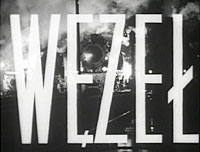 Węzeł
Węzeł
Poland, 1961, black and white, 10 mins
In terms of conception and execution, Railway Junction is clearly part of the group that also includes the previous year’s The Musicians and People on the Road. Once again, there’s an abiding concern with presenting the lives of working people, though this time there’s no distracting element of musical or acrobatic glamour: these men not only work night shifts at a railway junction but, as the bookending commentary highlights at the start, a freight junction at Tarnowskie Góry that ordinary commuters will never see in action.

The opening shots would grace anything in British Transport Films’ acclaimed output – there’s something ineffably magnificent about low-angle shots of steam trains belching white clouds of smoke across the screen. But most of the film is set behind the scenes as the railway marshallers and dispatchers get to work, with much of the running time taken up with a montage of men and mouthpieces as they bark elaborate instructions over the phone and tannoy.
Just as The Musicians had made use of important lighting innovations, so Railway Junction makes similar advances in sound. According to Mikołaj Jazdon’s notes accompanying PWA’s DVD release, this film was a major breakthrough for Karabasz and his team, because he had access to much smaller and lighter recording equipment, with the result that, in the director’s words, “it became incomparably easier to capture the daily speech and portray people’s individual mannerisms, temperatures and personalities, locked in words, pauses, hesitations, failures, etc.” It’s clear by comparing this film with its predecessors that not only is there much more directly synchronised sound, but it’s also processed and edited in a much more ambitious and creative way.

Although the film is ostensibly less tuneful than its two predecessors, Karabasz nonetheless contrives to create something that sounds convincingly like a musical piece out of the sounds of the dispatch desk, the rhythmical picture and sound editing (courtesy of Lidia Zonn, the director’s wife) becoming strangely hypnotic. We’re never shown the outcome of these increasingly complex requests, or have more than the faintest idea of what they actually mean, but that’s not these men’s concern: their job is to make sure that things run smoothly in that particular time and place. It’s a snapshot of experienced professionals on the job, and it would be unseemly to interfere with their work.
- Director: Kazimierz Karabasz
- Camera: Stanisław Niedbalski
- Sound: Halina Paszkowska
- Editing: Lidia Zonn
- Collaboration: Jerzy Szawłowski
- Narrator: Tadeusz Bukowski
- Production Co-ordinator: Ryszard Żerański
- Production Company: Wytwórnia Filmów Dokumentalnych (Documentary Film Studio)
The source print of the transfer included on PWA’s Polish School of the Documentary: Kazimierz Karabasz (Region 0 PAL) is occasionally a bit battered but this doesn’t affect appreciation at all. Unlike The Musicians and People on the Road, the titles immediately preceding this one on the DVD, the subtitles are in sync and seem to do an adequate job given the challenge of transcribing rapidly-cut, sometimes overlapping sentences. As for online commentary, Culture.pl‘s overview of Karabasz’ career mentions Railway Junction in passing.